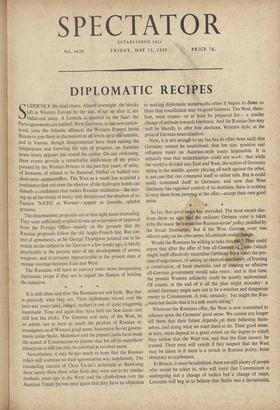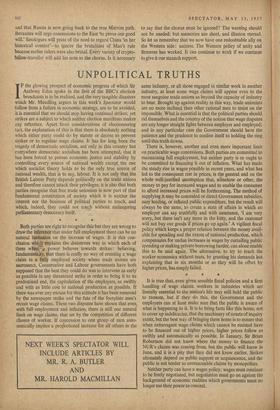DIPLOMATIC RECIPES
SUDDENLY the road clears. Almost overnight, the blocks left in Western Europe by the war, or set up after it, are bulldozed away. A formula is reached on the Saar: the Paris agreements are ratified; West Germany, in her new nation- hood, joins the Atlantic alliance; the Western Powers invite Russia to join theni in discussions at all levels up to the summit: and in Vienna, though disagreements have been raising the tempeiature and lowering the rate of progress, an, Austrian peace treaty appears just round the corner. On any reckoning, these events provide a remarkable vindication of the policy pursued by the Western Powers in the past few years; of unity, of firmness, of refusal to be flustered, bluffed or bullied into short-term appeasem!nts. The. West as a result has acquired a confidence that not even the shadow of the hydrogen bomb can disturb; a confidence that makes Russian retaliation—the tear- ing up of the treaty of amity with Brit* and the erection of an Eastern `NATO' at Warsaw—appear as juvenile, spiteful gestures.
The disarmament proposals are at first sight more interesting. They were suffiCiently explicit to win an expression of approval from the Foreign Office—mainly on the grounds that the Russian proposals follow the old Anglo-French line. But .con- trol of armaments, as Sir George Thompson pointed out in his article on the subject in the Spectator a few weeks ago, is hardly practicable in the present state of the development of atomic weapons, and is certainly impracticable in the present state of mutual mistrust between East and West.
The Russians will have to concoct some more invigorating diplomatic recipe if they are to regain the illusion of holding the initiative.
It is still often said that `the Russians are not fools.' But that is precisely what they are. Their diplomatic record over the post-war years (and, irleleed, earlier) is one of quite,staggering ineptitude. Time and again they have held the best Cards, and still lost the tricks. The firmness and unity of the West, let us admit, are at least as much the product of Russian in- transigence as of Western good sense. Successive Soviet govern- ments under Stalin, Malenkov and the present junta have made the sound' of Communism so sinister that for all its superficial attractions it still can only be enforced at revolver point. Nevertheless, it may be too much to hope that the Russian rulers will continue on their ignominious way indefinitely. The resounding success of Chou En-lai's technique at Bandoeng must surely show them what fools they were not to try similar methods years ago in the West: and the climb-down over the Austrian Treaty proves once `again that they have no objection to making diplomatic somersaults when it begins to dawn on them that conciliation may be good business. The West, there- fore, must expect—or at least be prepared for— a similar change of attitude towards Germany. And the Russian line may well be blandly to offer free elections, Western style, at the price of German neutralisation.
Now, it is not enough to say (as has so often been said) that Germany cannot be neutralised; that her size, position and influence make an Austrian-style treaty impossible. It is certainly true that neutralisation could not work: that while the world is divided into East and West, the notion of Germany sitting in the middle, quietly playing off each against the other, is not one that can commend itself to either side. But it could easily commend itself to Germans; and now that West Germany has regained control of its destinies, there is nothing to stop them from jumping at the offer—except their own good sense.
* * *
So far, that good cello has prevailed. The most recent elec- tions show no sign that the ordinary German voter is taken in' by the inane 'let's-trust-the-Russian-terms' policy peddled by the Social Democrats. But if the West German voter was offered unity on his own terms, his attitude could change.
Would the Russians be willing to take this rial-i? They could argue that after the offer of free all-German cat ions (which might itself effectively neutralise Germany for a time) the pro- cess of negotiation, of setting up election machinery, of framing a constitution, of fresh elections, and of creating an effective all-German government would take years : and in that time, the present Western solidarity could be quietly undermined. Of course, at the end of it all the plan might miscarry : a united Germany might turn out to be a resolute, and dangerous enemy to Communism. A risk, certainly : but might the Rus- ,,sians not decide that it is a risk worth taking?
Whatever the Russians offer, the West is now committed to reliance upon the Germans' good sense. We cannot any longer tell them that their future depends 4on their behaving them- selves, and doing what we want them to do. Their good sense, in turn, must depend to a great extent on the degree to which they realise that the We,st can, and that the East cannot, be trusted. Their trust will vanish if they suspect that the West may be taken in if there is a switch in Russian policy, from , obduracy to cajolement.
In Britain, it must be admitted, there are still plenty of people who would be taken in, who will insist that Communism is undergoing not a change of tactics but a change of heart. Leninists will beg us to believe that Stalin was a deviationist, and that Russia is now going back to the true Marxist path. Bevanites will urge concessions to the East 'to prove our good will.' Sinologues will prate of the need to regard China 'in her historical context'—to ignore the brutalities of Mao's rule because earlier rulers were also brutal. Every variety of crypto- fellow-traveller will add his note to the chorus. Is it necessary to say that the chorus must be ignored? The warning should not be needed; but memories are short, and illusion eternal. So let us remember that we now have one redoubtable ally on the Western side : success. The Western policy of unity and firmness has worked. It can continue to work if we continue to give it our staunch support.



































 Previous page
Previous page